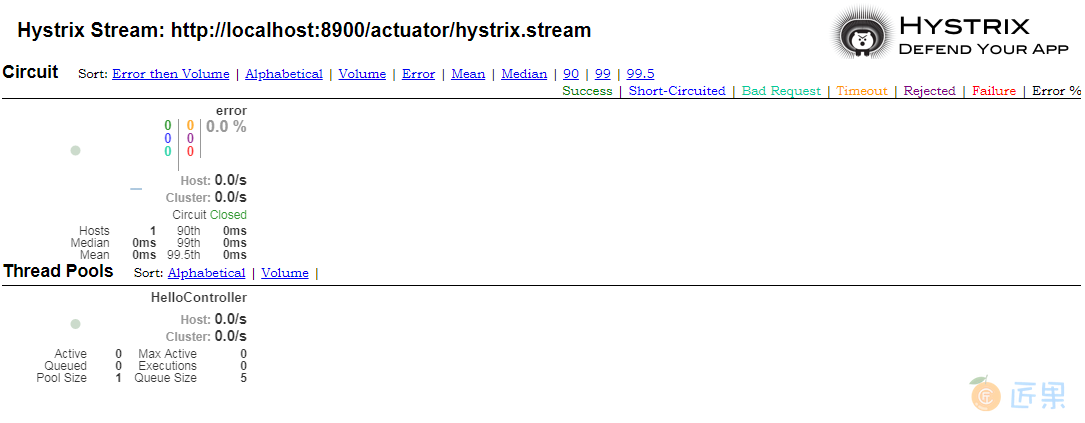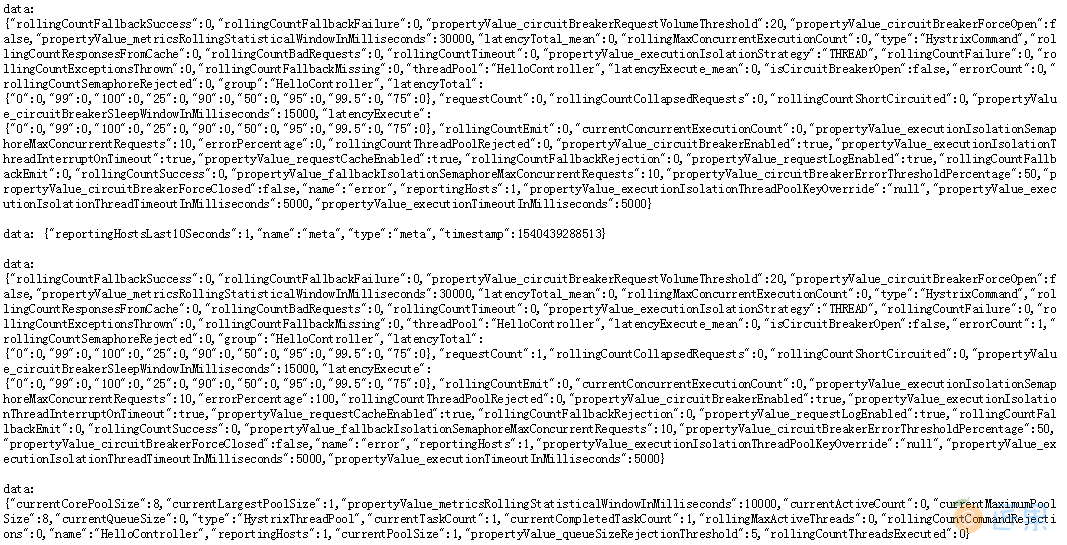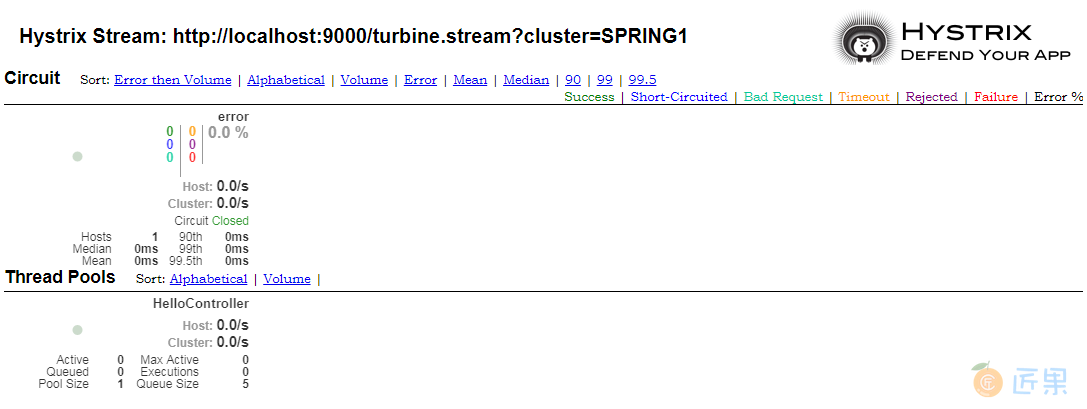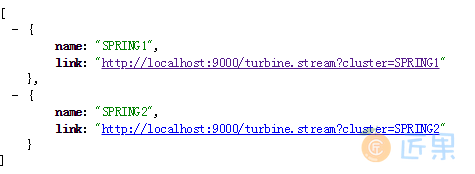Spring Cloud也基于Spring Boot的监控规范提供了Hystrix的指标监控信息。为了看到这些监控信息,首先需要在pom.xml中添加如下依赖。
<dependency>
<groupId>org.springframework.boot</groupId>
<artifactId>spring-boot-starter-actuator</artifactId>
</dependency>
Spring Cloud提供的Hystrix监控信息的endpoint ID是hystrix.stream,为了看到对应的监控信息,还需要把Hystrix对应的endpoint以http的方式发布出来。可以以下面的方式明确的指定需要发布hystrix.stream。
management.endpoints.web.exposure.include=hystrix.stream
也可以直接指定发布所有的endpoint。
management.endpoints.web.exposure.include=*
发布了hystrix.stream后,跟其它endpoint一样,可以通过/actuator/endpointId获取对应endpoint发布的信息,所以可以通过/actuator/hystrix.stream访问到Hystrix发布的监控信息,此时可以看到类似如下这样的信息。
你也可能看到界面上一直显示的是
ping:,这是因为应用刚启动,还没有对@HystrixCommand标注的方法发起请求,还没有产生对应的信息。
hystrix.stream直接看到的是JSON格式的数据,不直观。Hystrix有对应的图形监控界面,Spring Cloud也实现了对其的整合。使用图形监控界面需要在pom.xml中添加如下依赖。
<dependency>
<groupId>org.springframework.cloud</groupId>
<artifactId>spring-cloud-starter-netflix-hystrix-dashboard</artifactId>
</dependency>
然后在配置类上加上@EnableHystrixDashboard以启用对dashboard的支持。
@SpringBootApplication
@EnableHystrixDashboard
@EnableCircuitBreaker
public class Application {
public static void main(String[] args) {
SpringApplication.run(Application.class, args);
}
}
之后可以通过/hystrix访问到监控界面的首页,你会看到如下界面。
如上图红色标记部分所示,单机版访问的收集监控信息的地址是http://hystrix-app:port/actuator/hystrix.stream格式,笔者的应用部署在本机的8900端口,所以笔者收集监控信息的地址是http://localhost:8900/actuator/hystrix.stream,把它填入到第一个输入框,然后点击按钮Monitor Stream开始监控,你会看到类似如下界面。
在这个监控页面中可以看到各@HystrixCommand对应的断路器的状态,各请求的耗时情况,失败率,以及对应的线程池的状态等。
turbine
hystrix.stream只能看到单个应用的监控信息。通常同一个服务会部署多份,使用hystrix.stream查看每个单个应用的情况会比较麻烦,也不利于分析。Netflix提供了一个可以聚合多个应用的监控信息的工具,叫turbine。使用turbine时,一般会独立一个工程,在pom.xml中添加如下依赖。
<dependency>
<groupId>org.springframework.cloud</groupId>
<artifactId>spring-cloud-starter-netflix-hystrix-dashboard</artifactId>
</dependency>
<dependency>
<groupId>org.springframework.cloud</groupId>
<artifactId>spring-cloud-starter-netflix-turbine</artifactId>
</dependency>
turbine在聚合多个应用实例的监控信息是通过Eureka进行实例发现的,所以它本身将作为一个Eureka Client,还需要往pom.xml中添加Eureka Client的依赖。
<dependency>
<groupId>org.springframework.cloud</groupId>
<artifactId>spring-cloud-starter-netflix-eureka-client</artifactId>
</dependency>
使用turbine的工程的配置类上需要加上@EnableHystrixDashboard启用Hystrix Dashboard,加上@EnableTurbine启用turbine支持。而此时被聚合的应用可以不再启用Hystrix Dashboard。
@SpringBootApplication
@EnableHystrixDashboard
@EnableTurbine
public class Application {
public static void main(String[] args) {
SpringApplication.run(Application.class, args);
}
}
使用turbine还需要进行一些配置,如下配置指定了Eureka Server的地址,且当前应用不需要向Eureka Server进行注册。turbine.appConfig指定了需要聚合的应用,对应于向Eureka Server注册的serviceId,即spring.application.name指定的值,下面的配置指定的需要聚合的服务是spring1。turbine.aggregator.clusterConfig指定了集群的名称,集群的名称只是用来把turbine.appConfig配置的服务名称分个组,默认是服务名称的大写形式,所以我们这里配置为SPRING1。
eureka.client.serviceUrl.defaultZone=http://localhost:8089/eureka/
eureka.client.registerWithEureka=false
server.port=9000
turbine.appConfig=spring1
turbine.aggregator.clusterConfig=SPRING1
turbine.appConfig和turbine.aggregator.clusterConfig需要指定成一样的。
服务启动后,就可以通过/turbine.stream?cluster=SPRING1访问到类似如下这样收集到的群集SPRING1的信息。
跟hystrix.stream一样,上面收集到的信息是JSON格式,不直观。我们也可以在Hystrix Dashboard中查看对应的图形界面信息。通过访问/hystrix进入Hystrix Dashboard的首页,在输入监控地址的位置输入http://localhost:9000/turbine.stream?cluster=SPRING1,然后点击Monitor Stream按钮进入监控页面,你会看到类似如下这样的界面。
urbine也可以同时监控多个不同的服务,监控多个不同的服务时,多个不同的服务之间以英文的逗号分隔,集群名称之间也是以英文逗号分隔。比如下面的配置,可以通过集群SPRING1监控服务spring1的相关信息,通过集群SPRING2监控服务spring2的相关信息。
turbine.appConfig=spring1,spring2
turbine.aggregator.clusterConfig=SPRING1,SPRING2
当一个turbine中同时指定了多个集群信息时,可以通过/clusters查看定义好的集群信息。基于上面的配置信息访问http://localhost:9000/clusters可以看到如下信息。
当使用的集群名称是default时,访问turbine.stream可以不指定cluster。可以通过下面的配置指定cluster名称为default。下面的配置相当于指定了服务spring1和spring2的集群名称都是default,在监控的时候可以同时监控这两个服务的相关信息。
turbine.appConfig=spring1,spring2
turbine.clusterNameExpression="default"
如果是基于YAML配置,需要指定
turbine.clusterNameExpression的值为"'default'"。





